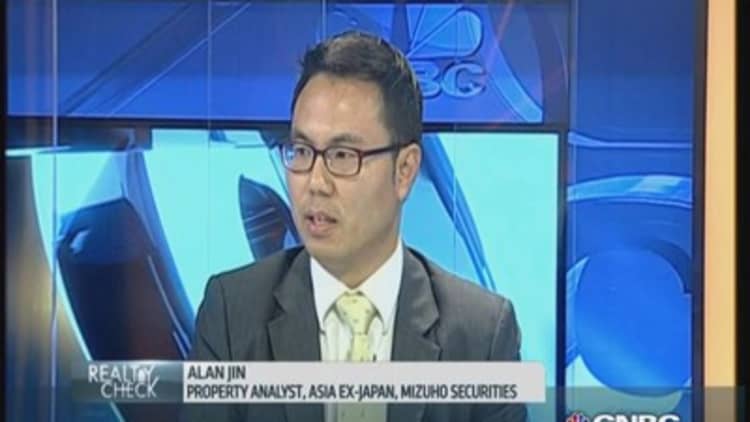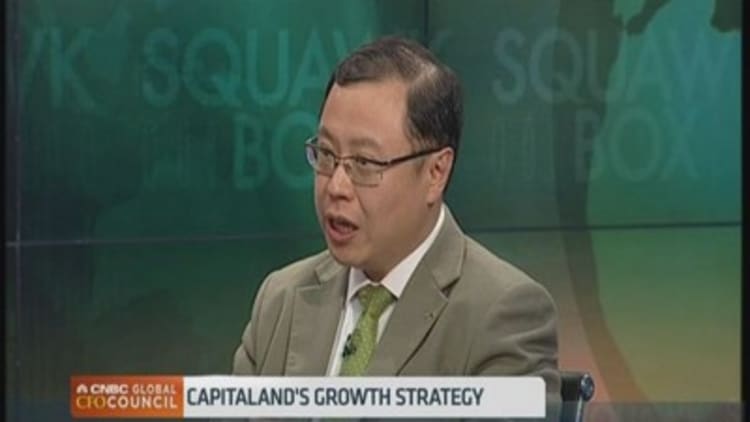
China's home prices posted a second consecutive annual drop in October, although monthly figures showed an improving sequential trend.
New home prices fell 2.6 percent in October from the year-ago period, after dropping an annual 1.3 percent in September, according to Reuters calculations of official data released by the National Bureau of Statistics Tuesday.
On-month, prices fell 0.8 percent, their sixth straight fall. But the extent of the declines appears to be easing: prices fell a monthly 1 percent in September after the 1.1 percent fall in August.
Read MoreChina's housing slump isn't hurting jobs, yet
Shares of developers fell on the news, weighing on the Shanghai Composite, which traded 0.4 percent lower Tuesday.
Economists have cited a property bubble as the biggest risk to China's economy. The sector contributes more than 15 percent to the world's second-largest economy and impacts more than 40 other sectors from cement to furniture.
Chinese authorities have introduced a slew of measures in response, most recently loosening mortgage restrictions by easing the qualification criteria for first-time buyers and relaxing loan terms for existing homeowners.
Second-tier cities going strong
According to Alan Jin, property analyst at Mizuho Securities, the sector is still sluggish but there are bright spots.
Read MoreWhy China's property slowdown isn't so scary: Goldman
"It's a correction. It's definitely not a crash. A lot of people feel it's a difficult year for Chinese property but volumes are actually at the second highest, last year was the peak. In China, there are a lot of replacement demand for older buildings to new, modern demands. That demand has been very robust," said Jin.
His view is backed by Singapore-based property developer Capitaland, which has about 40 percent exposure to the Chinese market.
Group CFO Arthur Lang told CNBC that while there's evidence of a slowdown in first-tier cities like Beijing and Shanghai, the story is markedly different on the provincial level.
"When you go to other cities like the second-tier cities, there's a very high supply of inventory that's left unsold. So from the on-the-ground presence... we are seeing a lot of differentiation and so we have to position ourselves properly," Lang said.
Read MoreChinese love US housing so much, now they're building it
Lang also sees recovery in sight for the bigger cities, where "fundamental" demand remains.

"China is still urbanizing. Even within the [bigger] cities, you also have buildings that are very old and households are still upgrading themselves. This is the first-time buyer market and upgrader market," he said.
Falling prices not that bad a thing
Analysts add that falling prices may not be a bad thing, especially if it helps to spur demand. While Michael Klibaner, regional director at Jones Lang Laselle, expects "the downturn in prices to remain in place for some time," he says what matters more to the broader economy are transaction volumes which are improving.
Read MoreTimeto short China housing stocks?
"If discounts bring first time home buyers into the showroom, then it's a good thing - price declines can improve affordability. [Since] firm action taken by policymakers end-September with respect to mortgage availability and policy, we have seen a significant increase in transaction volumes month-on-month and we see that as a crucial indicator of market health," Klibaner said.
To be sure, it could be some time before China's property market recovers fully and Mizuho's Jin sees further developer defaults in the near term as the sector works through excess inventory and rising leverage.
"I think that's a common concern. It's a crowded market; there are too many developers. But with 80,000 developers in the country, if smaller developers go bankrupt, that's totally reasonable," Jin said.

